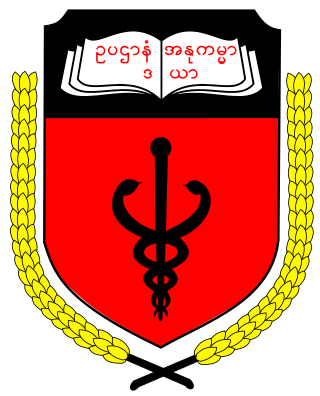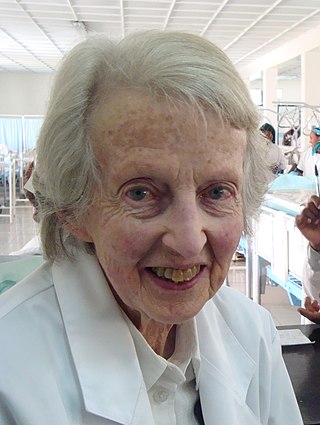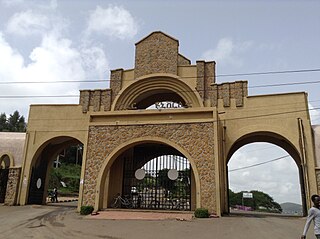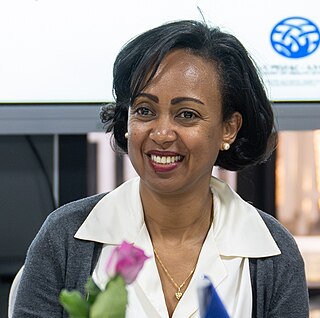A Doctor of Medicine is a medical degree, the meaning of which varies between different jurisdictions. In the United States, and some other countries, the M.D. denotes a professional degree. This generally arose because many in 18th-century medical professions trained in Scotland, which used the M.D. degree nomenclature. In England, however, Bachelor of Medicine, Bachelor of Surgery (M.B.B.S.) was used: in the 19th century, it became the standard in Scotland too. Thus, in the United Kingdom, Ireland and other countries, the M.D. is a research doctorate, honorary doctorate or applied clinical degree restricted to those who already hold a professional degree (Bachelor's/Master's/Doctoral) in medicine. In those countries, the equivalent professional degree to the North American, and some others' usage of M.D. is still typically titled Bachelor of Medicine, Bachelor of Surgery.

Addis Ababa University (AAU) is a national university located in Addis Ababa, Ethiopia. It is the oldest university in Ethiopia. AAU has thirteen campuses. Twelve of these are situated in Addis Ababa, and one is located in Bishoftu, about 45 kilometres (28 mi) away. AAU has several associated research institutions including the Institute of Ethiopian Studies. The Ministry of Education admits qualified students to AAU based on their score on the Ethiopian University Entrance Examination (EUEE).
A medical school is a tertiary educational institution, professional school, or forms a part of such an institution, that teaches medicine, and awards a professional degree for physicians. Such medical degrees include the Bachelor of Medicine, Bachelor of Surgery, Master of Medicine, Doctor of Medicine (MD), or Doctor of Osteopathic Medicine (DO). Many medical schools offer additional degrees, such as a Doctor of Philosophy (PhD), master's degree (MSc) or other post-secondary education.

The University of North Texas Health Science Center at Fort Worth – HSC, Health Science Center, Health Science Center at Fort Worth – is an academic health science center in Fort Worth, Texas. It is part of the University of North Texas System and was founded in 1970 as the Texas College of Osteopathic Medicine, with its first cohort graduating in 1974. The Health Science Center consists of six schools with a total enrollment of 2,338 students (2022-23).

The University of Medicine, Mandalay, located in Mandalay is one of five medical universities in Myanmar. The university offers Bachelor of Medicine, Bachelor of Surgery (M.B.,B.S.) degree and postgraduate degrees in medical science.
A medicalintern is a physician in training who has completed medical school and has a medical degree, but does not yet have a license to practice medicine unsupervised. Medical education generally ends with a period of practical training similar to internship, but the way the overall program of academic and practical medical training is structured differs depending upon the country, as does the terminology used.

Jimma University (JU) is a public research university located in Jimma, Oromia Region, Ethiopia. It is recognized as the leading national university, as ranked first by the Federal Ministry of Education for four successive years (2009–2012). The establishment of Jimma university dates back to 1952 when Jimma College of Agriculture was founded. The university got its current name in December 1999 following the amalgamation of Jimma College of Agriculture and Jimma Institute of Health Sciences.

Elinor Catherine Hamlin, AC, FRCS, FRANZCOG, FRCOG was an Australian obstetrician and gynaecologist who, with her husband, New Zealander Reginald Hamlin, co-founded the Addis Ababa Fistula Hospital, the world's only medical centre dedicated exclusively to providing free obstetric fistula repair surgery to poor women with childbirth injuries. They also co-founded an associated non-profit organisation, Hamlin Fistula Ethiopia.

The University of Gondar, until 2003 known as the Gondar College of Medical Sciences, is the oldest medical school in Ethiopia. Established as the Public Health College in 1954, it is located in Gondar, in Amhara Region of Ethiopia. In 2010, the university offered 42 undergraduate and 17 postgraduate programs.

St. Mary's University is an private higher education institution located in the capital Addis Ababa, Ethiopia. After fifteen years of service as a college first and a university college since 2008, it earned university status from the Ethiopian Ministry of Education in September 2013.

The University of the Philippines Manila College of Medicine (CM) is the medical school of the University of the Philippines Manila, the oldest constituent university of the University of the Philippines System. Its establishment in 1905 antedates the foundation of the UP System and makes it one of the oldest medical schools in the country. The Philippine General Hospital, the national university hospital, serves as its teaching hospital.
Medical education in Philippines is principally offered and developed by accredited and government recognized medical schools in the country.
As of 2021, 11 universities in Uganda offer medical schools. Admission to medical school requires the candidate to have attained a Uganda Advanced Certificate of Education (UACE) as well as proficiency in Biology or Zoology, Chemistry and Physics at A-level standards. Training leading to the degree of Bachelor of Medicine and Bachelor of Surgery (MBChB) lasts five years. Major examinations are conducted after the first, second and fifth year, with additional evaluations after each clinical rotation. After successful completion of the fifth year, candidates complete a year of internship under the supervision of specialists. Postgraduate training is available at Makerere University School of Medicine and other Public and Private Universities in a number of medical and surgical disciplines. The training takes three to four years and leads to the Master of Medicine (MMed) degree. The East, Central and Southern Africa College of Health Sciences is nowadays another alternative postgraduate training pathway in Uganda, such as Membership [MCS (ECSA)] and Fellowship [FCS (ECSA)] of the College of Surgeons of East, Central and Southern Africa (COSECSA); as well as in Internal Medicine through the East, Central and Southern Africa College of Physicians (ECSACOP) and the College of Obstetrics and Gynecology of East, Central and Southern Africa (ECSACOG) for Obstetricians and Gynecologists.

The University of Health Sciences is a public university offering degrees in health sciences in Phnom Penh, Cambodia.

Addis Ababa Fistula Hospital, also known as AAFH and Hamlin's Addis Ababa Fistula Hospital, is a women's health care hospital based in Addis Ababa, Ethiopia. The hospital was founded by Australian physicians Catherine Hamlin and Reginald Hamlin, to care for women with childbirth injuries. It is the only hospital of its kind dedicated exclusively to treating women with obstetric fistula, a condition in the developing world where maternal health provisions are poor. All patients are treated free of charge.
The St. Paul Millennium Medical College's Hospital in Addis Ababa is the first largest hospital in Ethiopia.

Kesetebirhan (Kesete) Admasu is an Ethiopian physician who was the Minister of Health of Ethiopia between November 2012 and 2016. It was reported that he left the government after declining a new non-health cabinet ministerial portfolio during a cabinet reshuffle in November 2016. He was appointed as Minister of Health in October 2012 after serving as State Minister in charge of Health Programs from 2010 to October 2012. He is known for his critical role in implementing the health sector reform of the country when he served as Director General, Health Promotion and Disease Prevention between 2007 and 2010. Dr Kesete has been appointed as Chief Executive Officer of the Roll Back Malaria Partnership in February-2017.

Lia Tadesse Gebremedhin is an Ethiopian politician and physician who served as the Minister of Health from 12 March 2020 until 8 February 2024. Prior to her appointment, Lia served as State Minister of Health from November 2018. She also served as an Executive Director at the University of Michigan's Center for International Reproductive Health Training (CIRHT) in Ann Arbor, Michigan, as a CEO and Vice Provost in St. Paul's Hospital Millennium Medical College (SPHMMC) in Addis Ababa and as a Project Director of USAID's Maternal and Child Survival Program (MCSP) at Jhpiego-Ethiopia.
The Toronto-Addis Ababa Academic Collaboration is a university educational program to teach medicine in Ethiopia.

Higher education in Ethiopia has been improving in quality, standard, relevance, and academic freedom. Despite an expansion of private higher education and rising enrollment, the quality of education they render is still under question. Higher education supposed originated by Saint Yared music school in the sixth century in line with centuries old traditional education of the Ethiopian Orthodox Tewahedo Church. Modern higher education was commenced during the reign of Emperor Haile Selassie with the establishment of the University College of Addis Ababa, now called Addis Ababa University, in 1950. It then followed by Haramaya University and Ambo school of agriculture, today's Ambo University. By this time, there were only three secondary schools in the country, used as preparatory for college entrance.














